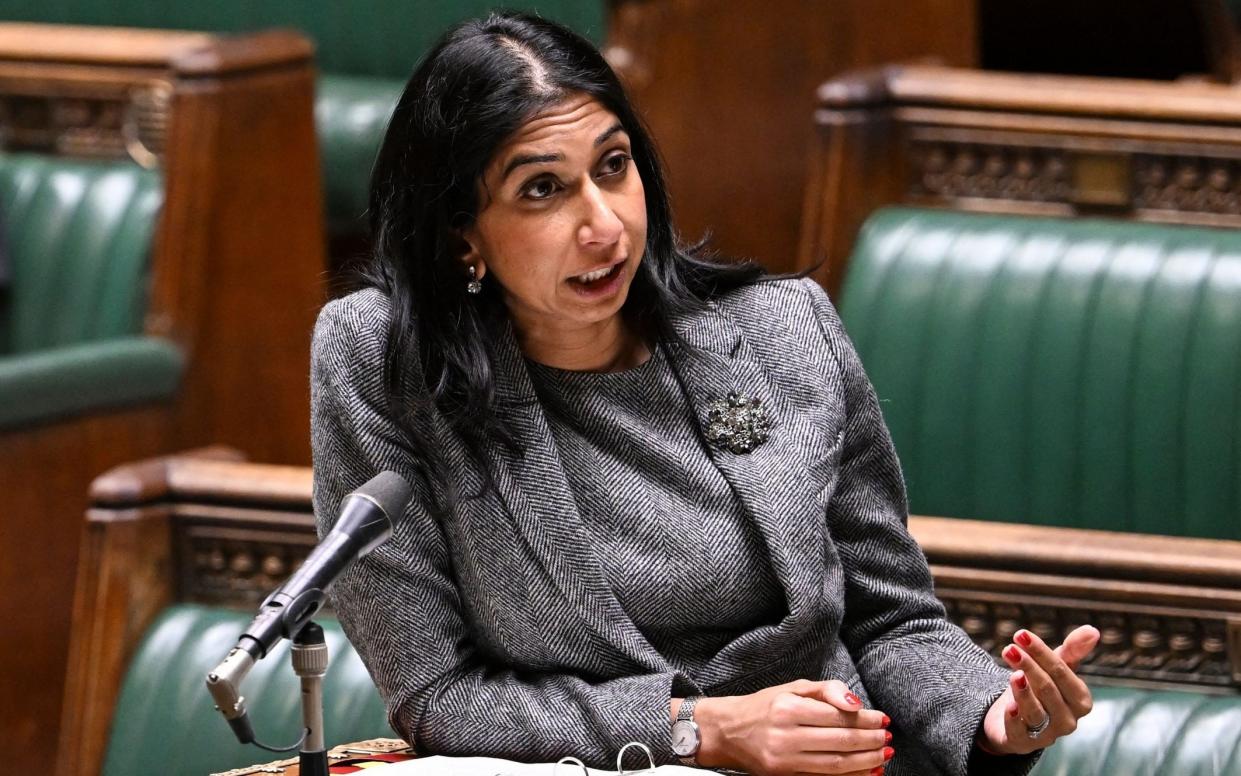European judges may be overruled on Rwanda deportations

Suella Braverman could ban the European Court of Human Rights from grounding migrant deportation flights in a deal to pacify Tory rebels, The Telegraph can reveal.
The Home Secretary is locked in talks with up to 60 Conservative MPs who are attempting to strip Strasbourg of the ability to interfere with Britain’s immigration policy.
In an attempt to quell what is set to be the biggest rebellion of Rishi Sunak’s premiership, ministers may agree to block the use of a controversial mechanism used by the European Court of Human Rights (ECHR) to ground the first flight to Rwanda last June.
It would mean migrants who arrive in the UK illegally could be deported even if they challenge the Government under human rights law.
The plan comes ahead of a major rebellion from both wings of the Conservative Party over Mr Sunak’s Illegal Migration Bill on Monday.
The largest group of rebels, from the Right of the party, believe the Bill is too weak and have joined an amendment that would ban British judges from using legal precedent from the ECHR when considering migration cases.
Ministers say they cannot leave the convention completely without breaching the UK’s international human rights obligations and “can work within it”.
Following calls between Robert Jenrick, the immigration minister, and rebel ringleaders on Saturday, it is thought a compromise could be brokered over emergency “Rule 39 orders”.
The orders are used to prevent the Government from deporting migrants when a human rights challenge is pending, delaying flights for months to make time for legal argument in Strasbourg.
Ms Braverman could insert a clause into the Illegal Migration Bill banning the application of the orders in the UK if an exemption for Britain cannot be negotiated with the court itself.
A Tory rebel source said the MPs who have signed the ECHR amendment may give Ms Braverman “breathing room to fix the loopholes” but added it would “depend on how strong she is at the despatch box” on Monday.
“It’s no secret that Suella is passionate about getting this right, but this Bill is the last chance saloon for us to fix the boats issue,” said another source.
A meeting is planned in Number 10 on Monday before the committee stage of the Bill begins.
Mr Sunak’s policy of deporting illegal migrants to Rwanda is currently on hold while it is challenged separately in the British courts. The case is awaiting a hearing at the Court of Appeal after judges granted an appeal to the High Court’s original decision that the policy was lawful.
A Home Office source said: “We must work to stop the boats as a priority – that’s what the British people expect.
“Then we can turn to safe and legal routes, but this alone will not impact the crossings – we can’t put the cart before the horse. And in terms of the ECHR, we’ve been clear that we can work within it and don’t need to leave the convention to make this Bill work.”
At the committee stage of his Bill on Monday, Mr Sunak will also face rebellions from Conservatives who feel it is too harsh and want child refugees to be exempted from the Government’s policy to deport all migrants who arrive in Britain illegally.
Another moderate group, led by the Tory MP Tim Loughton, hopes to force Downing Street to announce a long-awaited new “safe and legal route” for refugees.
Mr Sunak has said he will not announce any new routes until he has “got a grip” on illegal migration and brought down the number of small boat crossings in the Channel.
The Telegraph understands that, under draft plans, up to 20,000 refugees could eventually be settled in Britain each year under a new partnership with the UN’s refugee agency. Parliament would be given a vote on a refugee cap each year, with the UN finding refugees for resettlement from war-torn countries.
The scheme would come in addition to existing routes the UN runs for Ukrainians and Afghans, as well as the separate scheme for Hong Kongers.
One Conservative rebel who supports the new route said Mr Sunak should announce it immediately to send a “powerful message” to other countries that Britain would “shoulder its international obligations”.
But ministers are understood to be concerned that opening the route for refugees without reducing small boat numbers would be perceived as a weakening of the Government’s immigration policy and could be unpopular with the public.
Polling shows that 57 per cent of voters already think the projected net migration figure of 245,000 by 2027 is too high, including 71 per cent of Conservative voters.
The UNHCR, the UN’s refugee agency, said it would welcome a new route for refugees, but had not yet been asked by the UK Government to set one up.
A Government source said: “Our Stop the Boats Bill will tackle the problem while being compliant with our international obligations.”

 Yahoo News
Yahoo News 
